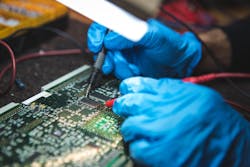U.S. Chip Industry Lobbying to Stay Open Despite Virus Fears
The U.S. semiconductor industry is lobbying federal and state governments to have chip production plants labeled as essential businesses that are allowed to operate despite lockdowns to contain the spread of the novel coronavirus. The Semiconductor Industry Association (SIA), a top trade group representing the sector, is trying to lift its chances for exemptions to orders in states around the U.S. to close nonessential businesses.
The group, which represents U.S. chip manufacturers from Intel and Texas Instruments to Micron Technology and Globalfoundries, has argued that their output is essential for the livelihood of the U.S. economy. It is urging the Department of Homeland Security to roll out recommendations to keep fabs open during the worsening outbreak. The efforts are colliding with orders around the U.S. to limit the movement of people and infections.
John Neuffer, SIA president and chief executive, argued in a blog post that chips are critical to infrastructure, ranging from telecommunications networks to power grids. They also underpin broad swathes of the American economy, including healthcare and manufacturing. Chips are also critical parts used in personal computers and cloud data centers, which are both key to businesses increasingly telling people to work remotely.
Devi Keller, who leads the trade group's global policy efforts, said in a statement that due to "the highly integrated and global nature of the semiconductor supply chain, shortages created by operating restrictions in one region cannot be readily made up by production in other regions." She said the shortages could lead to delays in the supply chain, hitting electronics production. U.S.-based companies control 45% global market share in chips.
U.S.-based chip makers have not complained about production constraints due to the virus. Micron CEO Sanjay Mehrotra said last week that the fallout has not seriously hurt its manufacturing operations to date. He said the company plans to obey government orders, adding that it was forced to shut down production plants in Southeast Asia for a short time due to a sudden lockdown. The fabs have since restarted limited production.
Mehrotra warned that tougher government orders could result in temporary or prolonged shutdowns at its other fabs. Micron is also preparing for supply shortages and logistics issues that could hamper its ability to maintain production. It is stockpiling more of the raw materials used to manufacture chips and stashing more at fabs to reduce logistics delays, he said. The company is also expanding testing and assembly lines at its fabs.
Intel, the world's largest vendor of chips used in cloud servers and data centers, is also maintaining production while safeguarding the health and safety of its employees. The Santa Clara, California-based company's chief executive, Robert Swan, recently said in a letter to customers that it has been business as usual for its production line and factory operations. Intel operates fabs in California, Arizona, Oregon and other U.S. locations.
Micron, which sells DRAM and NAND memory used in smartphones and data centers, has also taken precautions to impede the virus's transmission on its production lines. Micron, the world's No. 3 memory chip manufacturer, has started to alternate shifts and separate employees from each other to suppress the spread of the deadly sickness. Micron oversees 13 production plants around the world, including in Utah and Idaho.
The crisis is also leading to uncertainty for other players in the semiconductor market. Applied Materials, the world's largest seller of chip manufacturing equipment, warned that business could be harmed by the global spread of the coronavirus. The company on Monday said that shutdowns aimed at blocking the outbreak are resulting in "major disruptions in the supply chain and logistics operations that support the chip industry."
New York, the current epicenter of the virus in the U.S., has granted requests from chip manufacturers to stay open as more of the country shuts down due to the outbreak. The SIA said that these production plants are among the cleanest places in the world, with workers entering and exiting the factory floor through airlocks while wearing coveralls, boots, hoods, face masks, and gloves to protect the silicon chips from contamination.
The semiconductor industry employs roughly 250,000 people in the U.S., according to the SIA. Around half of all production plants operated by American chip manufacturers are located in the U.S. The SIA said that 19 states are home to major fabs.
About the Author
James Morra
Senior Editor
James Morra is the senior editor for Electronic Design, covering the semiconductor industry and new technology trends, with a focus on power electronics and power management. He also reports on the business behind electrical engineering, including the electronics supply chain. He joined Electronic Design in 2015 and is based in Chicago, Illinois.

